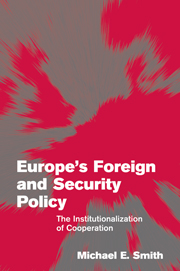Book contents
- Frontmatter
- Contents
- List of tables
- Acknowledgments
- List of abbreviations
- Introduction: foreign and security policy in the European Union
- Part I Institutions and foreign policy cooperation: the theoretical and empirical terrain
- Part II The institutionalization of cooperation
- 3 Origins: intergovernmentalism and European Political Cooperation
- 4 Information-sharing and the transgovernmental EPC network
- 5 Norms, rules, and laws in European foreign policy
- 6 Organizations and European foreign policy
- 7 Toward governance: the Common Foreign and Security Policy
- Part III Residual institutional issues
- Conclusion: beyond the CFSP: institutions, defense, and the European identity
- References
- Index
6 - Organizations and European foreign policy
Published online by Cambridge University Press: 21 January 2010
- Frontmatter
- Contents
- List of tables
- Acknowledgments
- List of abbreviations
- Introduction: foreign and security policy in the European Union
- Part I Institutions and foreign policy cooperation: the theoretical and empirical terrain
- Part II The institutionalization of cooperation
- 3 Origins: intergovernmentalism and European Political Cooperation
- 4 Information-sharing and the transgovernmental EPC network
- 5 Norms, rules, and laws in European foreign policy
- 6 Organizations and European foreign policy
- 7 Toward governance: the Common Foreign and Security Policy
- Part III Residual institutional issues
- Conclusion: beyond the CFSP: institutions, defense, and the European identity
- References
- Index
Summary
Once EPC began generating its own norms and rules in the late 1970s, the stage was set for a far more comprehensive approach to EU foreign policy cooperation a decade later: the CFSP. Before examining the CFSP, however, we must digress for a moment to consider the role of permanent organizations in EU foreign policy. These organizations comprise budgets, professional staffs, buildings and facilities, unique policy goals, and a host of other features which affect both policy performance and institutionalization. As I noted in Chapter 3, although the Luxembourg Report briefly acknowledged the Commission and the European Parliament (EP) as supporting players in EPC, most EU states generally preferred EPC to remain a decentralized system dominated by national governments. Their strong preference for intergovernmental foreign policy cooperation created a barrier to both the involvement of existing EC organizations and the creation of any permanent organization to administer EPC.
However, this barrier gradually broke down and EC organizations began to affect the development of European foreign policy cooperation. Organizations that have achieved some level of permanency, legitimacy, and competent authority are more likely to influence the policy process, thus increasing the prospects for cooperative outcomes and institutional growth. Organizations have the capacity for coordinated, purposive action; as their permanent staffs are established, as their institutional memory develops in a particular policy area, and as policy norms are preserved and followed by these organizations, cooperative outcomes will be affected.
- Type
- Chapter
- Information
- Europe's Foreign and Security PolicyThe Institutionalization of Cooperation, pp. 145 - 175Publisher: Cambridge University PressPrint publication year: 2003

